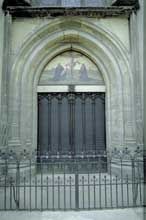 On October 31, 1517, Martin Luther, a Catholic Augustinian priest in Germany, nailed to the doors of Wittenberg Castle Church (essentially the bulletin board of this university town) an invitation to discuss and debate the pastoral practices of the church. His 95 theses raised the question of justification (salvation). He argued that if scripture taught that by God’s grace alone are we saved, why then did the church encourage the practice of selling indulgences—certificates that shortened one’s time in purgatory. He argued that salvation is God’s work alone, and no amount of human effort or money could manipulate the mind of God. His argument was solidly Catholic and in line with one of the church’s greatest teachers—St. Augustine. Yet, over the centuries, the church had developed practices, such as private Masses and payment for these Masses to be said for private intentions, that took on the appearance and eventually endorsed that salvation could be bought or bartered. Luther’s action was not meant to divide the church but rather to reform it and remind it of its roots. But in part because of an attitude of defensiveness and a bit of stubbornness on both sides, the church excommunicated Luther and Luther and his supporters condemned many of the church’s teachings and practices. Since then, Lutherans and Catholics have been divided.
On October 31, 1517, Martin Luther, a Catholic Augustinian priest in Germany, nailed to the doors of Wittenberg Castle Church (essentially the bulletin board of this university town) an invitation to discuss and debate the pastoral practices of the church. His 95 theses raised the question of justification (salvation). He argued that if scripture taught that by God’s grace alone are we saved, why then did the church encourage the practice of selling indulgences—certificates that shortened one’s time in purgatory. He argued that salvation is God’s work alone, and no amount of human effort or money could manipulate the mind of God. His argument was solidly Catholic and in line with one of the church’s greatest teachers—St. Augustine. Yet, over the centuries, the church had developed practices, such as private Masses and payment for these Masses to be said for private intentions, that took on the appearance and eventually endorsed that salvation could be bought or bartered. Luther’s action was not meant to divide the church but rather to reform it and remind it of its roots. But in part because of an attitude of defensiveness and a bit of stubbornness on both sides, the church excommunicated Luther and Luther and his supporters condemned many of the church’s teachings and practices. Since then, Lutherans and Catholics have been divided.
Vatican II issued a Decree on Ecumenism titled Unitatis Redintegratio (1964), calling for “the restoration of unity among all the followers of Christ” (1). Since then, leaders of both the Catholic and Lutheran churches have been dialoguing with each other, re-examining what each church truly teaches, and searching for common ground. A major reconciliation occurred on October 31, 1999, when the Joint Declaration on the Doctrine of Justification was signed by the Lutheran World Federation and the Catholic Church. After almost 500 years, Martin Luther’s invitation to discuss and debate the issue of justification was finally answered.
This turning point document basically states that both Catholics and Lutherans “hold the conviction that justification is the work of the triune God” (15). The major common ground points of this document state:
- Together we confess: By grace alone, in faith in Christ's saving work and not because of any merit on our part, we are accepted by God and receive the Holy Spirit, who renews our hearts while equipping and calling us to good works (15).
- All people are called by God to salvation in Christ. Through Christ alone are we justified, when we receive this salvation in faith (16).
- We also share the conviction that the message of justification directs us in a special way towards the heart of the New Testament witness to God's saving action in Christ: it tells us that as sinners our new life is solely due to the forgiving and renewing mercy that God imparts as a gift and we receive in faith, and never can merit in any way (17).
- We confess together that all persons depend completely on the saving grace of God for their salvation (19).
- We confess together that God forgives sin by grace and at the same time frees human beings from sin's enslaving power and imparts the gift of new life in Christ (22).
- We confess together that sinners are justified by faith in the saving action of God in Christ (25).
- We confess together that in baptism the Holy Spirit unites one with Christ, justifies, and truly renews the person (28).
- We confess together that persons are justified by faith in the gospel “apart from works prescribed by the law” (Rom 3:28) (31).
- We confess together that the faithful can rely on the mercy and promises of God (34).
- We confess together that good works – a Christian life lived in faith, hope and love – follow justification and are its fruits (37).
Read the whole text of the Joint Declaration here.
No comments:
Post a Comment